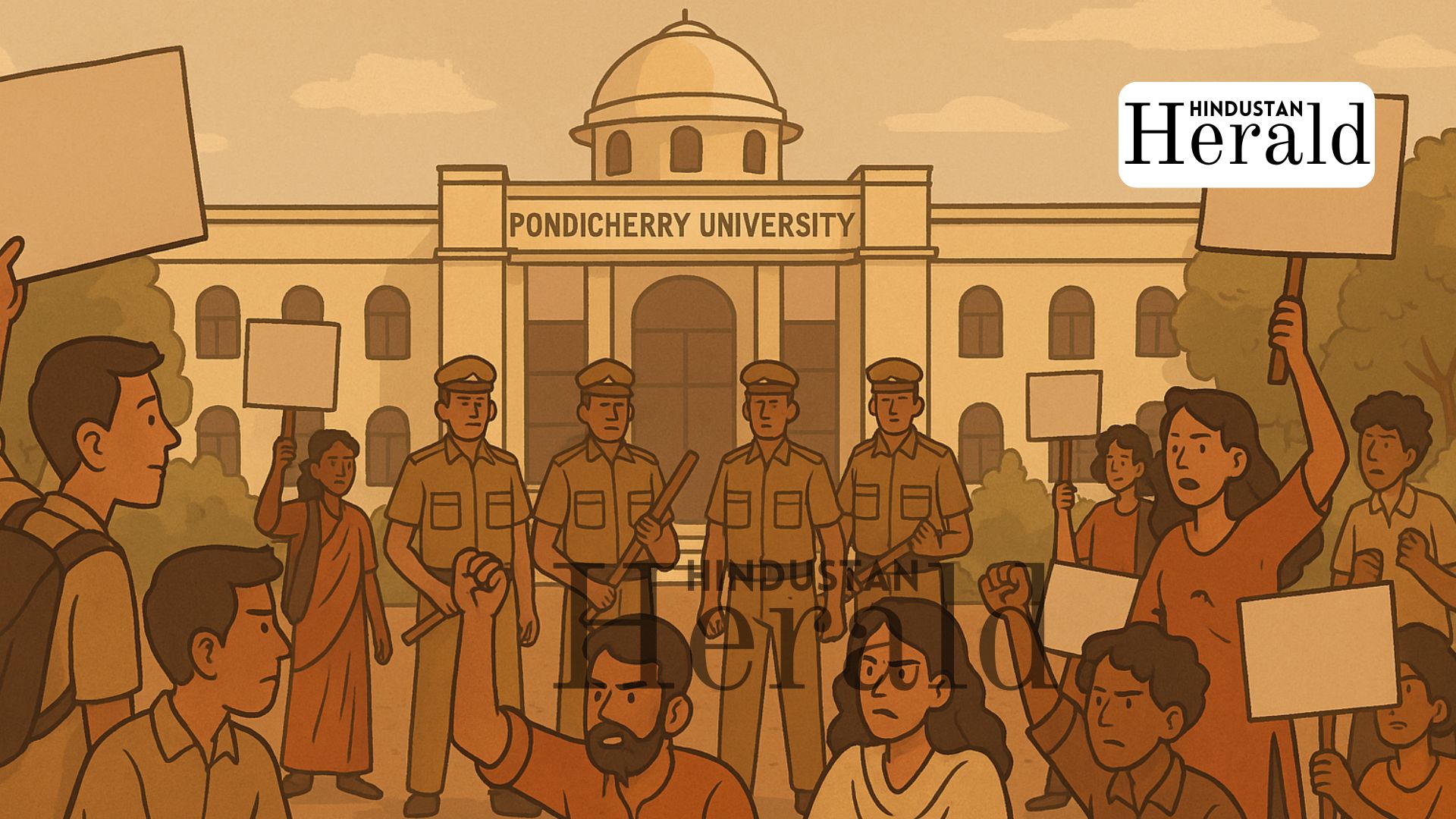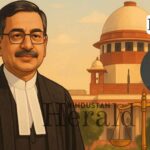Puducherry, October 11: It was supposed to be another routine Friday at Pondicherry University. Then the police showed up. By evening, batons had swung, students were bruised, and 24 young people were sitting in custody, accused of doing little more than asking for accountability.
The protest started in the morning, small at first. Students gathered near the admin block, holding placards and chanting, asking the university to suspend two professors, Dr. C. Madhavaiah and A. Praveen, both accused of sexual harassment.
Someone had leaked audio recordings a week ago. The voices, students claimed, were unmistakable. One man is demanding explicit photos. Another hint that grades could be used as leverage. The clips spread like wildfire through WhatsApp groups. By Friday, patience had snapped.
“They Could Have Talked To Us. Instead, They Hit Us.”
For hours, the students sat on the pavement, blocking no gates, just waiting. Then police vans rolled in. “They could have talked to us,” said a third-year economics student, clutching her bandaged wrist. “Instead, they hit us. For what? For sitting?”
When the lathis came down, panic took over. A few students ran; others tried to shield their friends. Videos from phones show officers pushing, shouting, and dragging people toward vans. By sunset, 24 students, six of them women, were detained.
Police said they were following orders to maintain order. The administration called the protest “unauthorized.” Nobody seems to know who gave the final word to send in the force.
Old Case, Old Excuses
The university insists this isn’t new. Officials say the audio clips were part of a “closed case” from earlier this year and that a team of senior officers had already looked into it, finding “no prima facie evidence.”
Students don’t buy that. They point to the Internal Complaints Committee (ICC), the panel meant to handle sexual-harassment complaints, saying it violates UGC rules because it lacks student members. “How can we trust a committee made up only of professors?” one protester asked. “They protect their own.”
Inside faculty circles, opinion is split. Some quietly agree the inquiry was superficial. Others warn against “mob justice.” But few defend the decision to call the police. “That was the moment everything broke,” one lecturer said. “You don’t use lathis on your own students. Ever.”
Familiar Story, Different Campus
If all this sounds familiar, it’s because it keeps happening. Delhi University, Hyderabad Central, BHU, and Visva-Bharati all have faced student uprisings over how sexual-harassment cases are handled. The UGC’s 2015 guidelines were supposed to fix it. On paper, they did. In practice, they sit gathering dust in office drawers.
A Chennai lawyer who works with campus survivors put it bluntly: “Universities follow due process only when it protects them.”
Campus In Limbo
Back on campus, things are half-frozen. Ph.D. viva, guest-faculty interviews, even routine classes, everything’s either postponed or uncertain. The lawns that usually hum with chatter are quiet except for police still patrolling near the gate.
Just a few weeks ago, the university had proudly announced new postgraduate diplomas in Agamic Studies and Rock Art. Today, those posters flap sadly in the wind, reminders of a different mood, one that belonged to a calmer campus.
Vice-Chancellor Gurmeet Singh hasn’t spoken publicly since the clashes. Insiders say a new inquiry panel might be formed, possibly with outside members. But for now, there’s no formal word, only rumours.
“Suspend The Accused, Not The Students”
By Saturday morning, students lit candles outside the hostel gate. A sheet of cardboard read, “Suspend the accused, not the students.” Some cried; others just stared at the ground.
“This isn’t about politics,” one student said softly. “It’s about feeling safe in the place we live.”
Teachers are uneasy. The campus feels brittle. A few say both sides need to calm down, but that sounds naïve after the blood and batons. Trust, once cracked, doesn’t mend quickly.
What Happens Next
The detained students are expected to walk free soon. The protests, however, will continue. Student groups AISA, SFI, and independents are already planning a second wave of demonstrations next week.
The administration hopes the weekend will cool tempers. Few here believe that. “You can’t police silence forever,” one senior faculty member said, shaking his head. “Sooner or later, somebody has to listen.”
For now, Pondicherry University stands at a standstill, bruised, tense, and waiting to see whether this moment turns into reform or just another headline that fades.
Stay ahead with Hindustan Herald — bringing you trusted news, sharp analysis, and stories that matter across Politics, Business, Technology, Sports, Entertainment, Lifestyle, and more.
Connect with us on Facebook, Instagram, X (Twitter), LinkedIn, YouTube, and join our Telegram community @hindustanherald for real-time updates.
Covers Indian politics, governance, and policy developments with over a decade of experience in political reporting.






